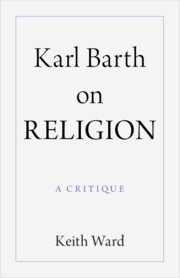Book contents
- Karl Barth on Religion
- Karl Barth on Religion
- Copyright page
- Contents
- 1 Revelation as Sublimation
- 2 Barth’s Theology of Religion
- 3 The Revolt against Liberalism
- 4 The Nature of Revelation
- 5 Revelation against Religion
- 6 The Failure of Religion
- 7 The Failure of Philosophy
- 8 Religion and Truth
- 9 Universal Grace
- Select Bibliography
- Index
8 - Religion and Truth
Published online by Cambridge University Press: 14 November 2024
- Karl Barth on Religion
- Karl Barth on Religion
- Copyright page
- Contents
- 1 Revelation as Sublimation
- 2 Barth’s Theology of Religion
- 3 The Revolt against Liberalism
- 4 The Nature of Revelation
- 5 Revelation against Religion
- 6 The Failure of Religion
- 7 The Failure of Philosophy
- 8 Religion and Truth
- 9 Universal Grace
- Select Bibliography
- Index
Summary
Truth and justification are logically dissimilar, for sins can be forgiven, but errors can only be corrected.
There can be many finite forms of the Eternal Word, and Jesus may be only one.
Faith is not only for the weak and godless, as Barth suggests, but for those who seek spiritual truth.
Humans are not ‘enemies of grace’ or ‘monsters’; they are often good and faithful.
Christianity is not only the home of the godless who are forgiven, but also of the godly (though they too need grace).
Barth sees medieval Christianity as a ‘worldly configuration’. But it was also a power for creativity, charity and wisdom.
Barth protests against the autonomy of ‘modern man’. But he exaggerates the negative, and autonomy can be seen as an important human value.
Other Enlightenment values such as human rights, human fulfilment, and freedom of conscience can be seen as properly Christian implications of ‘love of neighbour’.
‘wrestling with God’ is not a story of enemies of God being forgiven, as Barth claims, but a story of persistence in prayer bringing divine blessing.
Keywords
- Type
- Chapter
- Information
- Karl Barth on ReligionA Critique, pp. 135 - 158Publisher: Cambridge University PressPrint publication year: 2024

